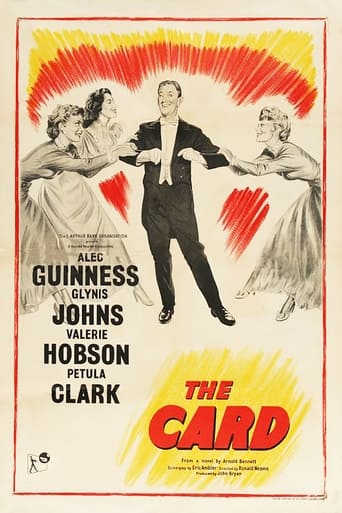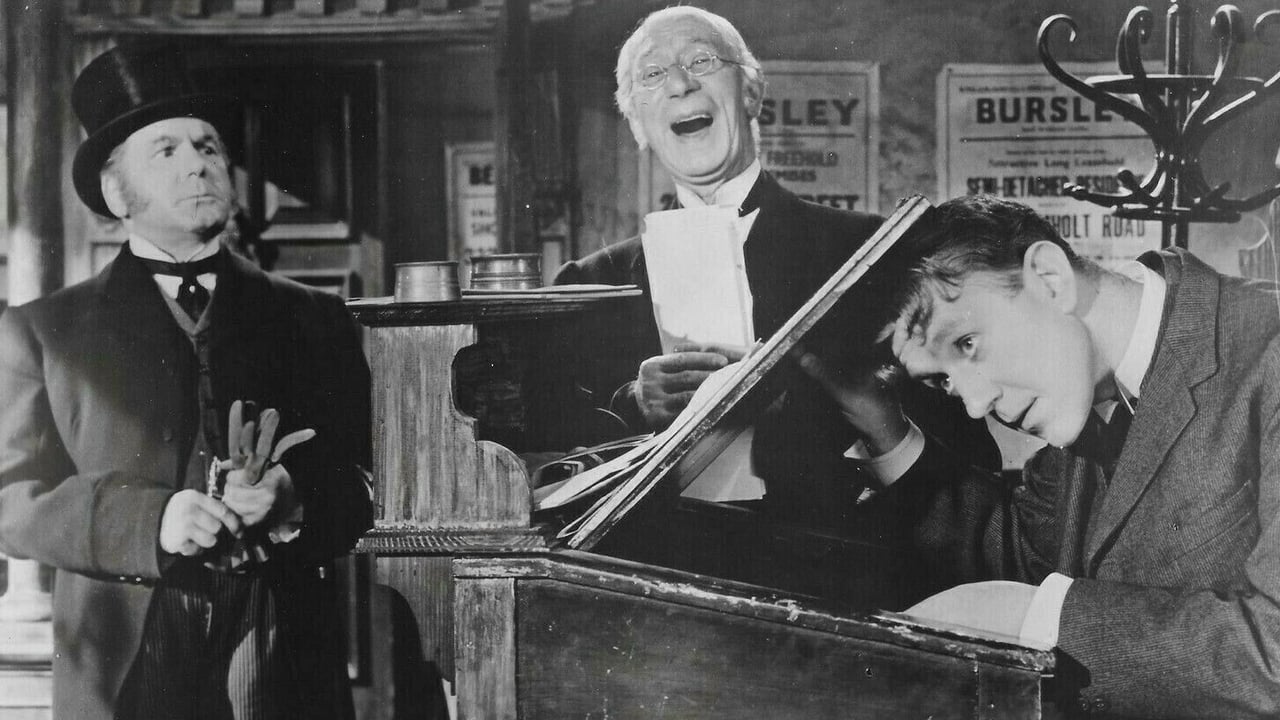jc-osms
I had just recently read Arnold Bennett's hugely entertaining comedic mini-novel on the inexorable rise of Denry Machin and had no idea it had ever been made into a movie, far less one with direction by Ronald Neame, a screenplay by Eric Ambler and starring Alec Guinness and Glynis Johns. Being from a different studio, it strictly speaking doesn't qualify as an Ealing Comedy but in every other respect, it surely does, displaying all the understated charm and verve of the very best of them.I was pleased that the film followed the novel so closely, with only a few incidents which didn't merit inclusion (such as Denry's elaborate trick to move his mother into a grander house, the incident with the Duchess's glove and his getting locked inside the Duchess's grand house) and one or two new ones added (like Ruth's happy ending and the parade for Denry and Nellie at the end). In fact the closing scene where Denry ends up back on his little mule-drawn carriage is a delightful touch of which I'm sure the author would have approved, indeed the whole scene which roll-calls all of Denry's past achievements is a very clever device.Guinness, as you would expect, is superb as the get-ahead heart-of-gold Denry but he is matched by Johns as the go-getting spendthrift Ruth, with a wheedling voice that would turn milk. Valerie Hobson is grand as the charitable, down-to-earth Duchess while the young Petula Clark is charming as the innocent Neillie who gets her just desserts too.There are many lovely moments in the film, like when's he crowd makes way for Denry to boldly dance the Duchess at her own ball for a £5 bet, the incident of Ruth's runaway carriage as she attempts to welsh on her rent, Denry's bold takeover of the ailing local football team to further his mayoral prospects and of course his devastating one-liner at Llandudno station to put Ruth in her place at long last.This superb little film deserves to be much better known as indeed does the parent novel. Do yourself a favour and read the book first and then treat yourself further by watching this marvellous adaptation straight afterwards. It's double delight.
James Hitchcock
A "card" in Edwardian slang was a "character", someone able to get himself talked about. (Or at least in Edwardian British slang; the word does not seem to have been used in this sense in the United States, which explains why Arnold Bennett's novel was published over there as "Denry the Audacious"). By 1952 this usage already sounded a bit outdated, but Bennett's title was kept for this film version, although it was entitled "The Promoter" for American audiences.The film was not made by Ealing Studios, but it came out during that studio's heyday and has certain similarities with the famed Ealing Comedies, not least the presence of Alec Guinness in the starring role. Like several of those comedies, its theme is that of the "little man" taking on the system. There is, however, an important difference. Some commentators such as Simon Heffer have seen the Ealing Comedies as characterised by an essentially conservative world-view, but there is one feature which has always struck me as more socialist. Whenever the "little man" tries to take on the system as an individual, as Guinness's characters do in "The Lavender Hill Mob" and "The Man in the White Suit", he generally ends up losing. When a whole community of "little people" takes on the system, as in "Whisky Galore", "Passport to Pimlico" or "The Titfield Thunderbolt", they generally end up winning. In "The Card" the little man comes out triumphantly on top. As in a number of Bennett's other books, the story is set in the Staffordshire Potteries. The film is mainly faithful to plot of the novel, although it omits some incidents, such as Denry's winter sports holiday in Switzerland. The hero is Edward Henry (Denry) Machin, an ambitious young man from a working-class background, who works his way up to become a solicitor's clerk, then a rent collector for local landlords, then a successful and wealthy businessman, and finally the youngest-ever Mayor of his native town. The film also tells of his romances with the scheming, social-climbing Ruth Earp and the sweet young Nellie Cotterill (played here by Petula Clark, later to become better known as one of Britain's most successful pop stars of the sixties). Rags-to-riches stories like this one were a popular subject in 19th and early 20th century literature, but were normally treated in a very serious, earnest way, a chance for the writer to lecture his readers on the importance of the virtues of thrift, sobriety, diligence and hard work. Bennett, however, although he could be a very serious writer in other contexts, treats Denry's story as a comedy. Although Denry never actually does anything illegal, and only occasionally does something unethical (as a boy he cheats at an examination in order to win a scholarship to a prestigious private school), he is a smooth-talking charmer, the sort of successful man whose success is due more to living on his wits and taking advantage of any opportunity that comes his way than to diligence and hard graft. He owes most of his fortune to his creation of a Credit Union, persuading a local aristocrat to act as its Patroness, and his political success to his signing of a star centre- forward for the failing local football club.Guinness's performance as Denry is one of his best, capturing his character's audacious spirit while making him likable, avoiding the temptation (which might have beset some actors( of making him too much of a smart Alec. There are some good supporting performances, especially from Glynis Johns as the mercenary Ruth, although Clark's Nellie is a bit too anonymous. The film captures the optimism which was a feature both of the Edwardian era, when the original novel was written, and of the early fifties, the age of the Festival of Britain and of the Coronation. The film came out in 1952, the first year of our present Queen's reign, when people were already starting to talk about a "New Elizabethan Age", and encapsulates a lot of the "can-do" spirit of that period. At the end of the film a self-important local bigwig, who objects to Denry's elevation to the Mayoralty, asks "What great cause is he identified with?" "He's identified," comes the reply, "with the great cause of cheering us all up." "The Card" might not be an Ealing Comedy, but it certainly deserves to be mentioned in the same breath. 9/10
bkoganbing
The Card must have been an interesting if somewhat painful film for Alec Guinness to make. This might have been the most autobiographical piece of work Guinness ever did.In The Card Guinness plays the son of washerwoman who learned early on to keep an eye out for the main chance and always strive to improve yourself by whatever means. In real life Guinness's mother should only have been a washerwoman In fact she was a prostitute who never married his father, whomever that could have been. In real life Guinness overcame bigger obstacles than his character in The Card ever did.But I'm sure he drew from real life in playing Denny Machin. Guinness in 91 minutes goes from a humble clerk to a position of real power in his area of England. The story is how he did it, the legal and extralegal methods employed and the people he used. When you think about it, The Card is a kinder, gentler version of Room At The Top.Guinness courts two women on his way up, Valerie Hobson the widow of a local lord and dancing instructor Glynis Johns. Glynis is quite the climber herself as we learn when the story unfolds. In fact she nearly steals the film from Guinness, no easy task.The Card which was released in the USA under the title of The Promoter is a good followup to such other Guinness everyman roles like he had in The Lavendar Hill Mob. The screenplay is quite good, I was kept very entertained seeing how Guinness could always make lemonade out of lemons. Definitely required viewing for Alec Guinness's legion of fans.
didi-5
A classic Alec Guinness performance, in this case as Denry Machin, a man who sees opportunity around every corner. Typified by his line 'I just do this to make money', Machin is likable as he sets up his 'Thrift Club' to entice locals into giving him money so he can purchase goods at a huge discount.One of the first entrepreneurs, Machin is a lovable rogue and his story is a fun one to watch. A great British classic which showcases Guinness (one of our best actors) alongside British movie luminaries Glynis Johns, Valerie Hobson, and Petula Clark.Much later this story was made into a musical, but sadly that has never yet been filmed. It will be fascinating if that ever makes it to the screen.


 AD
AD



